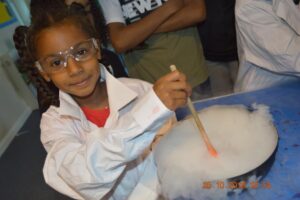Creating an engaging and enjoyable science experience for children is a rewarding challenge. To instil a love for science, educators can incorporate hands-on activities and captivating demonstrations. Let’s explore some effective strategies to make science fun for young learners.

1. Embrace Curiosity:
Encourage children to ask questions and explore their natural curiosity. Create a classroom environment that fosters a sense of wonder, and be ready to explore topics that spark their interest.
2. Hands-On Experiments:
Bring science to life through hands-on experiments. Simple experiments, like creating a volcano with baking soda and vinegar or growing plants from seeds, provide a tangible connection to scientific concepts.
3. Science in Everyday Life:
Connect science to the real world by discussing everyday phenomena. Explain the science behind rainbows, explain how everyday work objects, or explore the science of cooking. This helps children see science as a part of their daily lives.
4. Interactive Demonstrations:
Engage students with interactive demonstrations. Show the principles of physics using a simple pendulum, or demonstrate chemical reactions with colourful and safe experiments. The visual impact of demonstrations leaves a lasting impression.
5. Outdoor Exploration:
Why not take learning beyond the classroom by organizing outdoor activities, such as nature walks, bird watching, or exploring local ecosystems provides a hands-on experience that complements traditional classroom learning.
6. Storytelling with Science:
Integrate storytelling into science lessons, by crafting narratives that incorporate scientific concepts, making the subject matter more relatable and memorable for children. Stories help create a context for learning.
7. Collaborative Projects:
Encourage teamwork through collaborative science projects. Working in groups fosters communication and problem-solving skills. It also allows students to share ideas and learn from one another.
8. Use of Technology:
Incorporate age-appropriate technology to enhance learning. Virtual experiments, interactive simulations, or educational apps can make complex concepts more accessible and entertaining.
9. Science Games:
Introduce educational games that make learning fun. Board games, quizzes, or interactive online games can turn science into an exciting challenge. Gamifying the learning process adds an element of competition and engagement.
10. Celebrate Discoveries:
Celebrate scientific milestones and discoveries. Highlighting the achievements of famous scientists or historical breakthroughs helps students understand the impact of science on the world.
11. Field Trips:
Organize field trips to science museums, planetariums, or botanical gardens. Experiencing science in different settings adds variety to the learning process and allows children to witness the practical applications of scientific principles.
12. Create a Home Science Corner:
Dedicate a space at home for science exploration. Equip it with simple science tools, microscopes, or specimens for observation. Having a designated area emphasizes the importance of science in the overall curriculum.
Final Thoughts:
In the quest to make science enjoyable for children, educators play a pivotal role in shaping young minds and fostering a genuine interest in the subject. By embracing curiosity, incorporating hands-on experiments, and weaving science into everyday experiences, educators can transform the learning environment into a captivating journey of discovery.
The power of interactive demonstrations, outdoor exploration, and collaborative projects cannot be understated. These strategies not only make science more accessible but also instil valuable teamwork and problem-solving skills. Integrating technology and educational games further enhances engagement, turning science into an exciting adventure rather than a mere academic pursuit.
As we celebrate scientific milestones and encourage field trips to science-rich environments, we provide children with a holistic understanding of the subject’s significance in the world. The creation of dedicated science spaces within classrooms solidifies the idea that science is not just a subject to be studied but an ever-unfolding exploration awaiting their active participation.
In essence, the culmination of these approaches transforms the educational landscape, making science an integral and enjoyable part of a child’s learning journey. By nurturing curiosity and providing diverse avenues for exploration, educators lay the foundation for a generation of inquisitive minds who view science not as a chore but as a thrilling adventure of discovery and understanding.








